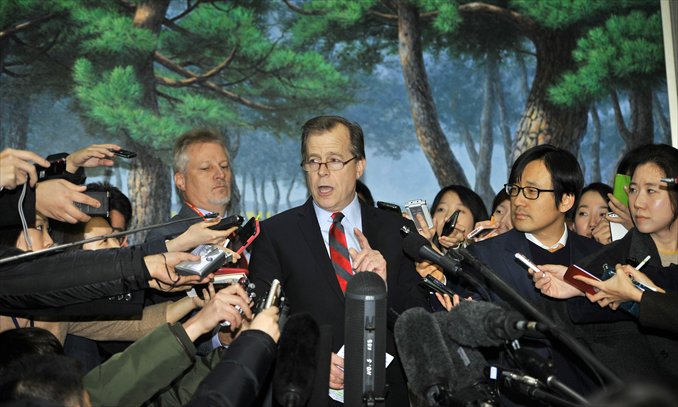NK vows higher-level nuclear test

North Korea on Thursday threatened to carry out a new nuclear test and more long-range rocket launches targeting its "sworn enemy" the US.
The move came a day after the UN Security Council voted unanimously to condemn North Korea's rocket launch in December and decided to strengthen existing sanctions against the country. China on Wednesday urged all relevant parties to restrain from actions that might escalate the situation in the region following Pyongyang's statement.
China hopes North Korea will "stay calm, be discreet in words and deeds and look at the long term interest and push for the resumption of the Six-Party Talks," Chinese foreign ministry spokesman Hong Lei told reporters.
In a statement carried by the official KCNA news agency and attributed to the National Defense Commission, Pyongyang said the tests would be part of an "upcoming all-out action" that marked a "new phase" in the country's anti-US struggle.
"We do not hide that a variety of satellites and long-range rockets will be launched and a nuclear test of higher level will be carried out in the upcoming new phase" the statement said.
"When it comes to nuclear issues, North Korea wants to have direct negotiations with the US," Yoo Ho-yeol, a North Korean studies professor of the Seoul-based Korea University, told the Global Times. "This is the reason why Pyongyang specifically targets the US."
"Based on North Korea's past nuclear tests in 2006 and 2009, the possibility of a third is highly likely," Yoo said. "But the problem is when. The North will observe how UN sanctions are implemented and seek the right timing that can leverage their bargaining power."
Glyn Davies, the US special envoy on North Korea who was paying a visit to South Korea on Thursday, urged Pyongyang not to risk going ahead with a third test.
In Seoul, South Korea's defense ministry said Thursday it believed North Korea is ready to conduct another nuclear test if the country's leadership decides to take such a step, according to South Korea's Yonhap news agency.
Former US Forces Korea (USFK) commander Burwell Bell, who was at a local forum in Seoul predicted Thursday that North Korea would hold the nuclear test in the next three to four months, Yonhap said.
Cai Jian, deputy director of the Center for Korean Studies at China's Fudan University, told the Global Times that North Korea might not conduct the test in the near future.
"Pyongyang might wait to see what policies the new South Korean president and the Obama's new administration take toward North Korea and then decide on its next move," he said.
If North Korea conducts another nuclear blast, it would be the first under new leader Kim Jong-un. The nation's previous two nuclear tests both drew strong UN condemnations and sanctions.
The North's next test could use plutonium leftovers, or it could instead use a new material, highly enriched uranium, the Washington Post reported.
"If North Korea uses highly enriched uranium in its next test, this will mark a major breakthrough in its nuclear technology. And the US and South Korea will see this as a more serious threat and therefore could urge tougher international sanctions," Cai said.
Pyongyang also declared in its statement that "there will no longer exist the Six-Party Talks and the September 19 joint statement," referring to a joint statement in 2005 in which the Six-Party Talks' nations reaffirmed the goal of denuclearization of the Korean Peninsula.
But this doesn't mean that the Six-Party Talks are finished, analysts said.
"It's still a very useful channel. It might go through a transition period of multichannel talks for a while but eventually it will return to the six way dialogue," Yoo said.
Park Gayoung and agencies contributed to this story
Click to read more: N.Korea vows to continue nuclear program despite UN resolution